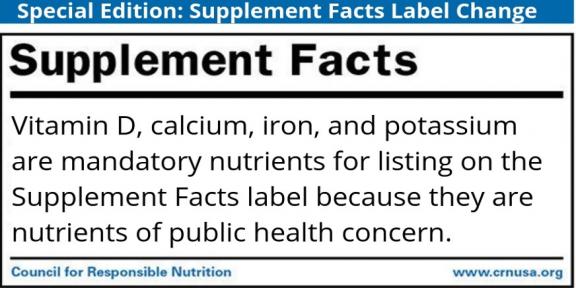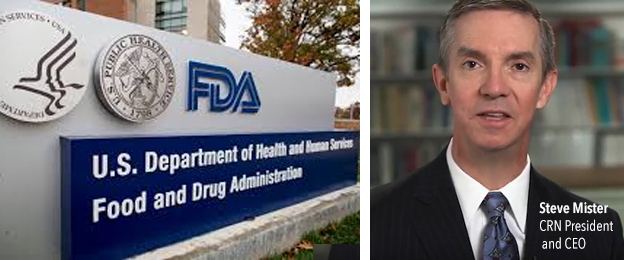A topline report from the Council for Responsible Nutrition (CRN),
the leading trade association for the dietary supplement and functional food industry
Amarin Pharma complaint dismissed; upholds FDA exclusive jurisdiction over dietary supplements, protecting consumer access to omega-3 supplements
Retailers can continue to sell concentrated fish oil dietary supplements thanks to a recent U.S. Court of Appeals decision, Amarin Pharma, Inc. v. the International Trade Commission (ITC), that confirmed FDA’s exclusive enforcement jurisdiction over the provisions of the Food, Drug and Cosmetic Act (FDCA). The decision protects dietary supplement manufacturers’ and their ingredient suppliers’ ability to sell esterified EPA fish oil supplements, as well as assuring consumer access to affordable products that benefit their health.
The decision, delivered May 1, upheld ITC’s previous ruling to dismiss a 2017 complaint from Amarin seeking to prohibit marketing of esterified EPA-containing omega-3 products marketed as dietary supplements, alleging that these products should be considered “new drugs” under the FDCA. CRN welcomed the May 1 decision, as Amarin’s action “could have created a market monopoly for pharmaceutical companies over a subset of omega-3 products, hindered responsible manufacturers from selling beneficial fish oil supplements and removed consumers’ abilities to buy affordable products that benefit their health and well-being,” as President and CEO Steve Mister noted in a statement.
CRN has been involved in challenging Amarin’s actions since 2017, engaging with ITC, Congress and FDA and filing amicus briefs.
CRN’s Board says CBD not a bar to membership as it works to establish legal pathway to market
Responsible companies that market hemp-derived cannabidiol (CBD) in food and dietary supplements may now apply for membership in CRN, following a vote of the association’s Board of Directors in March. CRN’s leadership carefully considered the current business landscape along with the reality of FDA enforcement in this space and recognized that responsible marketers of CBD—including existing CRN members either already operating in the market or poised to do so—need the unified voice and proven leadership in regulatory and legislative processes that CRN provides as stakeholders work toward establishing a legal pathway to market.
CRN President and CEO Steve Mister observed that “FDA’s position on the legal status of CBD is based on a provision intended to protect the research investments of pharmaceutical companies, but enforcement of that provision has been nearly non-existent. CBD-related actions by FDA have been limited to Warning Letters directed at companies who market CBD-containing products making prohibited disease claims for these products—a violation for any dietary supplement.” FDA noted at a March 28 Congressional hearing that it is "using enforcement discretion right now" against those CBD products making “over-the-top” claims. FDA has since announced formal plans to protect consumers from such CBD products, including updating FDA’s website, forming an internal working group, and holding a public meeting on May 31. Companies marketing CBD who apply for CRN membership will be expected to demonstrate their compliance with all other relevant aspects of supplement or food regulation.
CRN’s CBD Working Group is developing comments in preparation for FDA’s May 31 public meeting and the association is working with Congressional allies to expedite FDA's decision. See more in the next story.
CRN engages Congressional allies on CBD, FDA funding and consumer access
Congressional Dietary Supplement Caucus (DSC) co-chairs Reps. John Curtis (R-UT) and Tony Cárdenas (D-CA) recently wrote to FDA urging the agency to identify and enforce a legal pathway to market for products containing cannabidiol (CBD). Engaging and growing the DSC is one of CRN’s legislative agenda priorities for the 116th Congress, along with identifying a legal path to market for CBD and increasing resources for FDA. CRN’s Government Relations team reached out to each of the 100-plus freshman Congressional offices within the first 100 days of this Congress, educating them on the benefits of dietary supplements and the industry’s impact on the economy and encouraging participation in the DSC. In addition, CRN is convening a “Day on the Hill” executive fly-in event with other trade associations of the dietary supplement industry on June 12 to present a unified voice of a mature industry aimed at lowering health care costs and increasing consumer access to our products. Learn more about CRN’s legislative agenda in this article by Senior Vice President, Government Relations, Mike Greene.
Label Wise consumer education campaign clarifies changes to ‘Supplement Facts’ labels
Retailers can take advantage of the “Label Wise” education campaign created by CRN to inform consumers of upcoming dietary supplement label changes and encourage overall label literacy. Calling specific attention to the “Supplement Facts” label changes as mandated by FDA, “Label Wise” offers easy-to-understand information on what consumers can expect to see when shopping for dietary supplements over the next couple of years while companies come into compliance. On the campaign’s website, www.BeLabelWise.org, visitors can view a short video that explains key changes including updates to daily values and how certain ingredients are measured. In addition to the video, the Label Wise site features a fact sheet, infographic, interactive “how-to” guide to reading a Supplement Facts label, and more. For details about how to use the materials or access to native files with space for your own organization’s branding, contact Gretchen Powers at gpowers@crnusa.org.
Read more:
- Coming soon to a supplement label near you
- Industry Embraces Transparency and Science With Updates to the Supplement Facts Label: How CRN Can Help You be Label Wise
Mature industry welcomes FDA updates on enforcement, innovation—with balance and funding
Retailers will find value in FDA’s newly announced Dietary Supplement Ingredient Advisory List, a new tool to quickly alert the public about ingredients that appear to be unlawfully marketed in dietary supplements. CRN commended FDA’s April 16 announcement of to protect consumers and exert greater regulatory enforcement in the dietary supplement space in its own statement and in discussion with industry trade press.
CRN welcomes FDA’s attention to innovation in the dietary supplement space along with enforcement against bad actors but did express concern that existing resources may be insufficient to support these initiatives. In an interview with Inside Health Policy, CRN’s Steve Mister responded to rumblings about exclusivity and advised that any changes to the Dietary Supplement Health and Education Act (DSHEA)—the landmark legislation governing the supplement industry, notably 25 years old this year—must balance consumer access and safety.
“They say they want to spur more innovation in the industry, but we’re concerned whether they’ll take that enforcement role more seriously,” Mr. Mister noted. “Exclusivity is not necessarily a popular term among consumers. It’s certainly not what we’re talking about when we talk about innovation in dietary supplements." Mr. Mister further elaborated on proposals to change DSHEA in an article for NutraIngredients, noting, “Whatever proposals surface, they should all be evaluated through the lens of maintaining DHSEA’s balancing act. DSHEA wasn’t etched in stone, but the tension and equilibrium between access and safety are worth preserving.”
 Short and Tweet
Short and Tweet
Know your #SupplementFacts

LABEL CHANGE FACT: Vitamin D, calcium, iron, and potassium are mandatory nutrients for listing on the Supplement Facts label because they are nutrients of public health concern.







